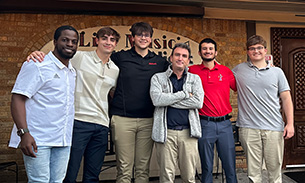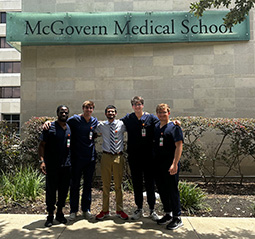Five biology majors took advantage of an opportunity this summer to shadow professionals in one of the largest medical schools in the country, accelerating the learning curve for a group already focused on a future in medicine.
Jehan Boyers ’25, Justin Lewis ’26, Robbie Manuzzi ’25, Mawuli Nevis ’25, and Caden Short ’25 studied in the obstetrics and gynecology department in the McGovern Medical School, the University of Texas’ teaching hospital in Houston, shadowing doctors in several departments over the course of a seven-week internship.
The McGovern Medical School is the ninth-largest medical school in the country with nearly 1,100 students and 6,500 faculty and staff.
It’s contained within the Texas Medical Center, the largest conglomeration of medical and life sciences institutions in the world. More than 106,000 people are employed there by 60 medical organizations, handling upwards of 10 million patient visits annually.
 The opportunity exists through a Wabash alumnus, Dr. Sean Blackwell ’89, director of the Gilstrap Center for Perinatal and Women’s Health Research and assistant dean of Healthcare Quality in Perinatal Medicine and Women’s Health at McGovern Medical School.
The opportunity exists through a Wabash alumnus, Dr. Sean Blackwell ’89, director of the Gilstrap Center for Perinatal and Women’s Health Research and assistant dean of Healthcare Quality in Perinatal Medicine and Women’s Health at McGovern Medical School.
The students appreciate the efforts of Jill Rogers, Wabash's pre-health advisor and Global Health Initiative program coordinator, for making them aware of this GHI-sponsored internship, and to Dr. Blackwell for facilitating this funded opportunity.
“It’s such an advantage to be able to have an experience like this,” said Manuzzi.
Each of the students amassed upwards of 300 hours learning in the hospital, getting an up-close look at the life of a physician and what their future may hold. Further, they spent time getting to know the subspecialties from fetal care to labor and delivery to oncology.
“This opportunity shows us the vastness of medicine and the role we could play in it. It’s definitely impacted my way of thinking about medicine,” Nevis said.
Most teaching days started around 7 a.m. at McGovern and usually began with rounds, where doctors discuss the patients they expect to see during the day in the hospital, giving the interns the opportunity to witness the day-to day operations, observe the skills of the doctors, and engage with them about their thoughts and approaches to certain procedures.
Things change depending on rotation. A surgical rotation might put them in the operating rooms, where they would change into hospital scrubs and prepare to witness a surgery. A rotation in the clinic would place them elsewhere on campus. As doctors interact with patients, the interns observed bedside manner.
“We’re trying to learn as much as possible and interact with physicians, residents, and patients to see their day-to- day lives,” said Nevis. “By following them all day, seeing what they do, watching their movements, we pick up on a lot of important details.”
day lives,” said Nevis. “By following them all day, seeing what they do, watching their movements, we pick up on a lot of important details.”
As a teaching hospital, the McGovern Medical School allows the interns and residents to engage with doctors more inquisitively. The Wabash interns were instructed to take notes and to not be afraid to ask questions about terms, procedures, or situations when the time arises.
“The doctors are really used to being in that teaching setting and are good at explaining things on the fly,” Manuzzi said. “A lot of the time, they will explain what they’re doing during a surgery or procedure, which has been extremely helpful in guiding our learning.”
Lewis feels the positive effects already. Not only does he feel far more familiar with the professional journey, but it’s also helped him picture the medical school and residency years, too.
“We’re gaining so much useful experience,” he said. “We’re doing much the same as what third-year medical students are doing for the first time, so it helps to know what we’re getting into. It really does help us see what this job is.”
The group has witnessed plenty, ranging from surgeries using the da Vinci Surgical System, a minimally invasive robotic procedure, to in-utero procedures, births, and C-sections.
“Being around surgeries, being able to scrub in, has shown me that I want pursue surgery in the future,” Short said.
Boyers went the opposite direction.
“What I’ve realized is how much I enjoy interactions with patients,” he said. “I like pediatrics and psychiatry, and those are less surgery focused. I’d rather be talking with patients than operating on them. That’s the beauty of this internship. It shows you every possibility, which guides you more and more.”
Collectively, the quintet is thankful to have had the experience.
“This is the best internship you can get as a pre-med student with the ability to interact with doctors of all types, med students, and residents,” Short said. “You get to understand the life of a doctor. We’ve done night shifts for a week, 12-hour shifts, all these things that help you understand what it is to be a doctor. Before I did this internship, I really didn't understand the full capacity of it. It’s been an incredible experience.”